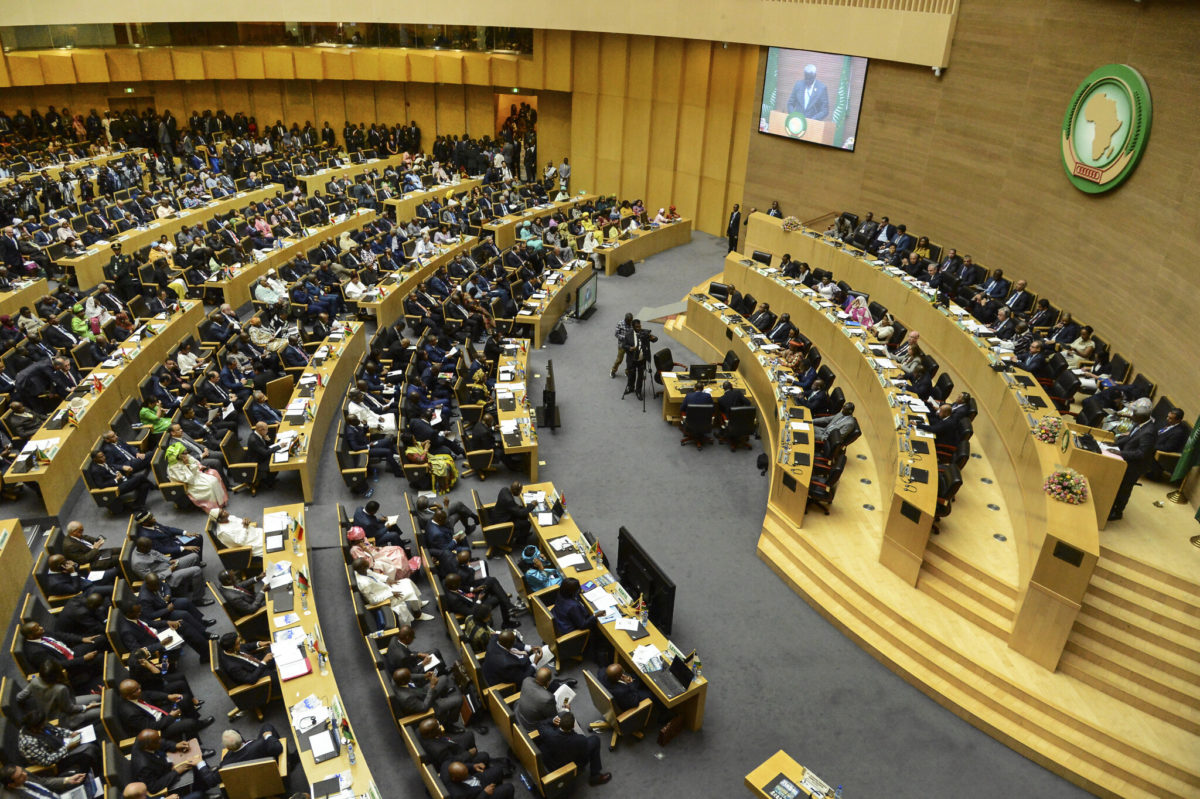
Israel

SA seethes as Israel scores diplomatic coup in AU
Published
3 years agoon
By
Nicola MiltzThe South African government this week lashed out at the recent decision by the African Union (AU) to grant Israel observer status.
After nearly 20 years of persistent diplomatic efforts, Israel last week attained observer status at the AU. The development was welcomed by Israel, who has long held that the Jewish state has much to offer Africa.
However, predictably, it has been shunned by the government and local pro-Palestinian groups.
In a statement on 28 July, the Department of International Relations and Cooperation (DIRCO), said it was “appalled” at the decision calling it “unjust” and “unwarranted”.
It said that in the context of the recent flare-up of violence in the Middle East, the decision was “inexplicable”, and accused the AU Commission of taking the decision unilaterally without consulting its members.
DIRCO said it would ask the chairperson of the commission to provide a briefing to all member states, which it hoped would be further discussed.
“South Africa firmly believes that as long as Israel isn’t willing to negotiate a peace plan without preconditions, it shouldn’t have observer status,” the statement said.
Earlier this week, the SA BDS coalition slammed the government for its silence on the matter, and for not immediately criticising the move like it has done in the past. The organisation urged the government, as well as other AU member states, to reject Israel’s claim to accreditation.
“We are extremely disappointed that our government didn’t immediately publicly reject the Israeli claim and announce that it would lodge an objection to the AU chair,” it said.
The SA BDS coalition accused Israel of “falsely claiming” that its assistance to African states in fields such as agriculture, technology, and economic development was philanthropic.
“In reality, this is simply opportunistic leverage,” it said, adding that Israel’s objective was to “muscle recipient states” to support it at the United Nations (UN) and other international fora.
One local pro-Palestinian media organisation tweeted “Remove the Zionist cancer from the AU”.
South Africa, along with several other African nations, has long opposed Israel’s desire to gain observer status at the 55-member continental organisation. While chairing the AU Commission from 2012 to 2017, Nkosazana Dlamini-Zuma strongly objected to Israel’s rapprochement with the organisation.
In November last year on the UN International Day of Solidarity with the Palestinian People, DIRCO Deputy Minister Alvin Botes accused Israel of “vociferously” lobbying African states to support its bid, saying that it was “more important than ever” to ensure that this didn’t happen.
Said Botes, “There is a growing and justifiable sense that certain African and Arab nations no longer see the liberation of Palestine as a common objective.”
He said Israel, with the support of America, was driving a wedge between these nations. “If Israel continues to score political victories while facing little resistance, it could eventually dominate Africa,” Botes said.
Algeria on Sunday condemned the decision of the AU to grant Israel observer status.
Israel previously held observer status at the Organisation of African Unity (OAU), but has long been thwarted in its attempts to get it back after the OAU was disbanded in 2002 and replaced by the AU.
Former Prime Minister Benjamin Netanyahu prioritised Israel’s relations with Africa during the latter half of his 12 years in office, including with several Muslim-majority countries on the continent.
Besides seeking new markets for Israeli expertise in fields like agriculture, high-tech, and security, Netanyahu was keen to improve African nations’ voting record on Israel-related matters in international fora such as the UN Security Council.
Aleligne Admasu, the Israeli ambassador to Ethiopia, Burundi, and Chad, on 22 July presented his credentials to Moussa Faki Mahamat, the chairperson of the AU Commission, at the bloc’s headquarters in the Ethiopian capital, Addis Ababa.
Israeli Foreign Minister Yair Lapid hailed it as a “day of celebration for Israel-Africa relations”, noting that Israel currently has relations with 46 African countries.
The move will enable stronger co-operation between the two parties on various aspects, including the fight against coronavirus and the prevention “of the spread of extremist terrorism” on the African continent, the statement said.
In a separate statement, Faki Mahamat stressed the AU’s position over the longstanding Israeli-Palestinian conflict, reiterating the bloc’s stance that a two-state solution was “necessary for peaceful co-existence”.
Steven Gruzd, the head of the African Governance and Diplomacy Programme at the South African Institute of International Affairs said it was a pragmatic decision by the AU rather than an ideological one, as “Israel has a lot to offer Africa”.
“South Africa will feel a little out-manoeuvred on this one, given that during Dlamini-Zuma’s tenure as AU commissioner, the proposal was blocked presumably by Arab states in the North of Africa as well as countries like South Africa.
“This seems to be a diplomatic coup for the Israelis. It has been quite a long time coming, and even though symbolic in many ways, it’s an entry into a forum where their interests are being discussed, and it will provide a platform for a deeper engagement with the continent.”
Since 2016, Netanyahu has been to Africa five times, displaying Israel’s keen interest in growing relations with African states, Gruzd said.
“Also, as part of the Abraham Accords process, we’ve seen normalisation with Morocco and Sudan, both Muslim-majority states. So, Israel’s forays into Africa is paying dividends, and I think it will be very pleased about this. South Africa is a strong supporter of the Palestinians, and I guess will see this as a defeat, but it’s not like pressure on Israel is going to be reduced by South Africa.”
Rowan Polovin, the national chairperson of the South African Zionist Federation (SAZF), welcomed the development, saying it was hopeful that AU members would work more closely with Israel on issues such as fighting the coronavirus, improving regional security, and implementing water, agricultural, and healthcare technology solutions.
“We are also further encouraged that the AU status may assist other African countries to do the same,” Polovin said.
“The SAZF believes that greater intercontinental co-operation with Israel is a sign that the South African government should follow suit in building and improving its relations with Israel. Furthering the partnership with Israel would bring increased positive benefits and impacts for all South Africans, and would help address the triple challenges of poverty, unemployment, and inequality.”
Israel re-established relations with Guinea in 2016 and Chad in 2019. In October 2020, Israel also signed a normalisation agreement with Sudan.
In July 2016, Netanyahu became the first Israeli premier in decades to travel to the continent when he visited Uganda, Kenya, Rwanda, and Ethiopia. There has been ongoing collaboration and engagement ever since with a number of African countries.
Meanwhile, the first direct commercial flights between Israel and Morocco landed in Marrakesh on Sunday, 25 July, more than seven months after the countries normalised diplomatic relations in a United States-brokered deal. This is another example of Israel and Africa moving closer together.
Passengers from Tel Aviv arrived on an Israir flight early on Sunday afternoon, and were met with dates, cakes, and mint tea at a welcoming ceremony organised in their honour. A second flight, by Israeli national carrier El Al, landed in Marrakesh later in the day. Both airlines are planning several flights per week to Marrakesh and Casablanca.
Morocco was one of four regional states to agree to normalise ties with Israel last year, along with the United Arab Emirates, Bahrain, and Sudan.
The normalisation deals between Arab states and Israel have been deemed a “betrayal” by the Palestinians, who believe the process should follow resolution of the Israeli-Palestinian conflict.











B. Yarmarkov
Aug 5, 2021 at 11:57 pm
Africa has some of world’s fastest-growing economies. Ironically…all these booming African countries have something in common, they all have a growing, and flourishing relations with the Jewish state of Israel.
Those top performers are Sudan (8.2%), Rwanda (8.1%) Côte d’Ivoire (7.3%), Ethiopia (7.2%), Senegal (6.8%), Benin (6.7%) and Uganda (6.2%) along with Kenya, Mozambique, Niger and Burkina Faso all expecting 6% growth.
The irony however doesn’t stop there. Nigeria, with its previous pro-Israel government, has seen it’s once booming economy slow down right down; since the current, anti Israel, Nigerian government came to power… similarly South African economy has been in turmoil since the Zuma government first introduced their political blinded hostilities towards Israel.
Nigeria growth stands at (2.5%) and South Africa’s (1.1%) respectively
This phenomenon is not unique phenomenon is not endemic to memetly Aftica… kind of makes you think… maybe Genesis 13:3 hold a lot more weight then previously thought as the now famous line proudly proclaims; “ I will bless those who bless you, I will curse anyone who treats you with contempt”